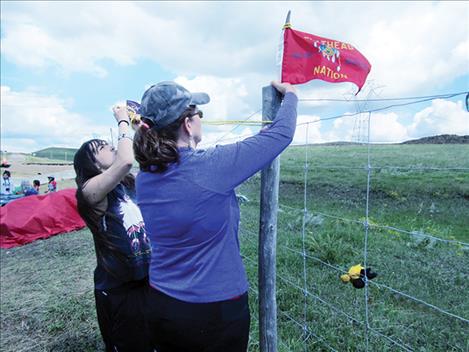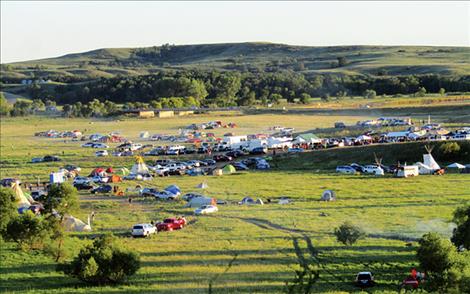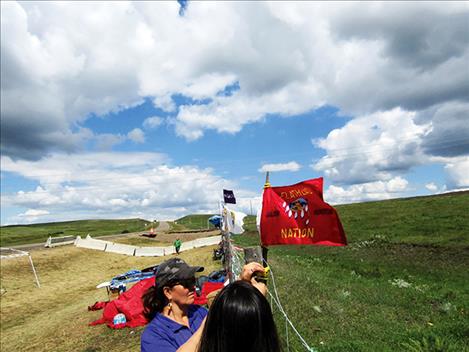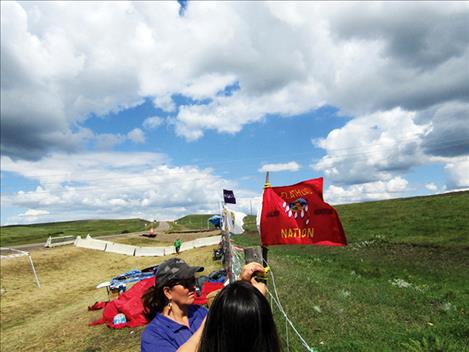Local tribe joins pipeline opposition
Hey savvy news reader! Thanks for choosing local.
You are now reading
1 of 3 free articles.
NORTH DAKOTA — In opposition to the construction of an oil pipeline, tribes across the United States are banding together, including the Confederated Salish and Kootenai Tribes.
CSKT signed a resolution on Aug. 16 expressing their opposition to the construction and operation of the proposed Dakota Access Pipeline over the North American continent due to the environmental risks to the Missouri River and the lack of communication with affected tribes.
The 1,172-mile pipeline crosses four states from North Dakota to Illinois to an existing pipeline so domestically produced oil can reach refineries, according to pipeline developer Energy Transfer Partners. Construction is currently at a standstill until a federal judge decides if the project can move ahead.
CSKT states that the U.S. Army Corps of Engineers approved the construction of the pipeline to run within a half-mile of the Standing Rock Sioux Reservation without the proper consultation or consent of that tribe. Opposition to the pipeline will continue until a consultation occurs, CSKT stated, and they plan to stand in solidarity with the Standing Rock Sioux Tribe and other tribes in opposition to the encroachment of the pipeline on tribal homelands.
CSKT Tribal Council Member Shelly Fyant traveled with Two Eagle River School history teacher Jaimie Stevenson and high school students Alexia Parizeau, Whisper Michel, and Naomi Stevens to North Dakota soon after the resolution was signed to camp with protestors for several days near Cannon Ball.
Fyant said travel to North Dakota took a bit longer than usual due to traffic restrictions on U.S. Highway 1806. She ended up taking an alternative route.
North Dakota Governor Jack Dalrymple authorized a restricted emergency declaration to manage public safety during the ongoing protest of the pipeline. He also authorized a transportation restriction stating concern about heavy pedestrian traffic and numerous vehicles parked along the highway.
Fyant said people from all over the world stayed at two camps to support the opposition to pipeline construction, which is ongoing.
“This isn’t really a protest,” she said. “It’s a protection of the water. When I was there, it was more about talking about what we have to do as an Indian nation to protect water. If these oil companies spill oil into the water, it affects everything — the land, the water, our food.”
Pipeline construction plans include a shutoff valve, inspection, and other safety measures, but, she said, things can go wrong.
“We just can’t take that kind of risk,” she said. “This has to do with the lifeblood of the earth, which is the water. This is a global water issue.”
Fyant said putting together the resolution opposing the pipeline wasn’t difficult. CSKT wrote a similar one back in 2014 opposing the Keystone XL pipeline. “
The Creator put all of these things here, gifts for the people to use, the fish, berries, animals we eat, skins, plants, roots for medicine,” she said. “They are gifts for our (everyone’s) use, not to destroy, and we want to protect that.”
It rained the first day she was at the camp, and it was nice and warm the next few days after the rain. Fyant said she shared huckleberries and chokecherry syrup with campers, and spent a lot of time in discussion about many issues.
“We also went up and put the (Confederated Salish and Kootenai) flag at the construction site,” she said.



















